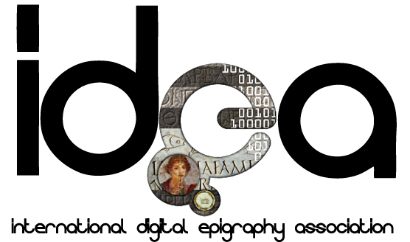Workshop 10

The tenth Epigraphy.info workshop will take place in Graz (Austria) from 24 to 26 March 2026.
Provisional Programme
DAY 1: March 24
DAY 2: March 25
DAY 3: March 26
| Session 6 | |||
| Chair: Annie Burman | |||
| 09:30 | 09:55 | Mariana Bodnaruk | Epigraphic Networks of Office and Faith: Digital Perspectives on the Fourth-Century Palatine Elite |
| 09:55 | 10:20 | Anna Fitiski̲na, Vladimir Ippolitov | Old East Slavic epigraphy (11–15th centuries) digitally approached |
| 10:20 | 10:45 | Dimitar Iliev, Kristiyan Simeonov | Creating a Digital Corpus of Old Church Slavonic Inscriptions: a Pilot Collection |
| 10:45 | 11:15 | Break | |
| 11:15 | 12:30 | Community discussion and reports, decisions, Steering Committee election | |
Call for Papers: Tenth Epigraphy.info Workshop
University of Graz, Austria — 24–26 March 2026
Dear colleagues,
We are pleased to announce the tenth Epigraphy.info workshop, to be held in Graz (Austria) from 24 to 26 March 2026. The event will be organized by the Department of Classics, Section Ancient History and Epigraphy, at the University of Graz, in collaboration with the Epigraphy.info Steering Committee.
The tenth Epigraphy.info workshop will be dedicated to the memory of Winfried Kumpitsch and will feature a special thematic focus on Sacred Spaces, Sacred Words: Digital Approaches to Religious Epigraphy, an area to which Winfried devoted much of his scholarly work and research. Alongside this theme, the workshop will continue the established tradition of bringing together scholars, students, and practitioners of digital epigraphy to exchange ideas, share experiences, and develop new collaborations (see https://epigraphy.info/ for past meetings).
Programme and Contributions
As in previous years, the workshop will consist of paper sessions, a poster session, and a variety of hands-on or training activities. We warmly welcome contributions in different formats, including:
- Research papers presenting projects, methodologies, or case studies (15 minutes + 5 minutes Q&A).
- Contributions to the thematic panel on Sacred Spaces, Sacred Words: Digital Approaches to Religious Epigraphy:
This panel invites papers that explore digital approaches to religion in its broadest sense.
Contributions may address written objects and their associations with the sacred sphere, as well as the study of cult sites, rituals, dedications, and religious figures through digital tools and methods.
Papers may also examine how digital modeling, data analysis, mapping, or visualization can enhance our understanding of religious practices, networks, and spaces.
The aim is to highlight how digital technologies can shed new light on the material, spatial, or textual dimensions of religious experience and open new avenues for the interpretation of religion. - Contributions on any other subject of relevance to the Epigraphy.info community.
- Posters highlighting new initiatives, educational activities, or updates on ongoing projects.
- Practical sessions, such as hackathons, demonstrations of digital tools, or training workshops.
Please indicate in your abstract the time you will need for your session.
Participation
The workshop is planned as an in-person event in Graz, fostering direct exchange and collaboration. However, a small number of sessions, including selected keynote lectures, will also be available for remote attendance.
Recordings of some presentations may subsequently be shared via the Epigraphy.info YouTube channel, and posters will be made accessible through the Epigraphy.info website, depending on the discretion of the presenters.
Contributors are further encouraged to deposit their work on Zenodo and link it to the Epigraphy.info community for long-term visibility.
Ficial Support
This section will be updated as additional support is confirmed.
- IDEA Funding for Early Career Scholars: The International Digital Epigraphy Association (IDEA) will sponsor early career scholars presenting at the upcoming meeting. A total of €1,000 is available to be distributed among eligible applicants whose work aligns with IDEA’s mission of promoting digital methodologies in epigraphic research. The selection will be made by the IDEA Directorial Committee based on the relevance of the applicants’ research to the association’s aims. Awardees will be required to join IDEA and provide proof of attendance after the event to receive their grant. Applicants should send a short CV, the abstract of their paper or poster, and a cover letter explaining how their work fits IDEA’s goals to info@eagle-network.eu by 15 January 2026. For full details and updates, please visit the EAGLE Portal.
Submission of Proposals
To participate, please submit an abstract (max. 250 words for papers and posters; max. 500 words for training sessions) using the online form no later than 15 November 2025. The deadline has been extended to 2 December 2025. The Steering Committee will review the submissions and circulate a provisional programme by 15 January 2025.
The deadline for poster submissions has been extended to 28 February 2026.
We look forward to welcoming you to Graz for this special occasion and honoring the memory of Winfried Kumpitsch together.
For any questions, please contact the Epigraphy.info Steering Committee at info@epigraphy.info.
The Steering Committee and the Local Organizers
Practical Information: Traveling to Graz
Venue: University of Graz – Main Building, Universitätsplatz 3, 8010 Graz, Austria
1. Basic Facts & Orientation
- Graz is the capital of the Styrian region (Steiermark) in southeastern Austria.
- The conference takes place at the University of Graz Main Building (Universitätsplatz 3).
- The city is served by Graz Airport (GRZ) and the main train station, Graz Hauptbahnhof (Graz Hbf).
- Graz has an integrated tram and bus network within fare zone 101, which includes the airport, train station, and university area.
2. How to Reach Graz
- By air: Graz Airport (GRZ) is the nearest airport (10 km south of the city). If there’s no direct flight, connect via Vienna and continue by train or bus (2–3 hours from Vienna).
3. From Graz Airport to the City / University
| Option | Route & Duration | Cost | Notes |
|---|---|---|---|
| S-Bahn S5 (train) | Walk 5 min to Flughafen Graz/Feldkirchen → S5 to Hauptbahnhof (12 min) | € 3.00 | Fastest and cheapest option. |
| Bus 630/631 + tram | Bus 630/631 to Puntigam → Tram 5 to Jakominiplatz → Tram 3/7 to Maiffredygasse → walk | € 3.00 | More changes, runs hourly. |
| Taxi / Uber | Direct to Universitätsplatz 3 (~ 20 min) | € 25 – 35 | Recommended for late arrivals or heavy luggage. |
4. Arriving by Train or Long-Distance Bus
If you arrive at Graz Hauptbahnhof (main station or FlixBus terminal):
- Bus 63 → stop University of Graz
- Bus 58 → stop Mozartgasse (2 min. walk)
- Total travel time: ~15 minutes
- Ticket: €3.00
5. Local Public Transport in Graz
- A single ticket (zone 101) covers trams, buses, and the airport train.
- Tickets can be purchased at machines, via the GrazMobil app, or from the driver.
- Key stops: Maiffredygasse (Tram 1, 3, 7) and Uni/Mensa (Bus 63).
- Useful apps: GrazMobil, BusBahnBim, ÖBB.
6. Walking or Cycling to the University
- The Main Building (Universitätsplatz 3) is a 15–20 minute walk from the city center (Hauptplatz) through the Stadtpark.
- Bike rentals (tim Graz) are also available.
7. Venue Orientation
- Main Building (Hauptgebäude): Universitätsplatz 3 – recognizable by its grand staircase and classical façade.
- Nearest stops: University (Bus 63) or Mozartgasse (Bus 58).
- Follow signs for “Universität Graz – Hauptgebäude.”
Accommodation
Click here to download a list of nearby hotels as PDF


